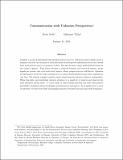Communication With Unknown Perspectives
Author(s)
Yildiz, Muhamet
DownloadSSRN-id2324154.pdf (643.3Kb)
OPEN_ACCESS_POLICY
Open Access Policy
Creative Commons Attribution-Noncommercial-Share Alike
Terms of use
Metadata
Show full item recordAbstract
Consider a group of individuals with unobservable perspectives (subjective prior beliefs) about a sequence of states. In each period, each individual receives private information about the current state and forms an opinion (a posterior belief). She also chooses a target individual and observes the target's opinion. This choice involves a trade-off between well-informed targets, whose signals are precise, and well-understood targets, whose perspectives are well known. Opinions are informative about the target's perspective, so observed individuals become better understood over time. We identify a simple condition under which long-run behavior is history independent. When this fails, each individual restricts attention to a small set of experts and observes the most informed among these. A broad range of observational patterns can arise with positive probability, including opinion leadership and information segregation. In an application to areas of expertise, we show how these mechanisms generate own field bias and large field dominance.
Date issued
2016-11Department
Massachusetts Institute of Technology. Department of EconomicsJournal
Econometrica
Publisher
The Econometric Society
Citation
Sethi, Rajiv, and Muhamet Yildiz. “Communication With Unknown Perspectives.” Econometrica 84, no. 6 (2016): 2029–2069. © 2016 The Econometric Society
Version: Author's final manuscript
ISSN
0012-9682